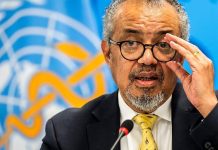AfricaPress-Tanzania: THE outbreak has caused global concern and economic uncertainty across most sectors as governments, businesses, and individuals adopt strategies to cope with unfolding events following the pandemic.
Most companies have put in place and executed continuity plans that have involved agile working systems and uptake of digital tools to facilitate work anywhere.
The telco industry has not been immune to unfolding events as Research firm Analysis Mason has forecast global revenues for telecoms operators to fall by 3.4 per cent year-on-year as the coronavirus pandemic edges the world towards recession.
Commenting on trends and impact of earlier measures taken by the telco industry, Vodacom Tanzania Managing Director Hisham Hendi said that the Telco regulator has been mindful of Covid-19 and has put in place measures to mitigate fallout arising from the regulations.
However, despite the Outbreak of Covid-19 paints prudent but positive picture of things to come. “As outlined in our Preliminary results announcement in May 2020, we barred 2.9 million customers in the last quarter of the year following TCRA’s instructions.
We have subsequently reconnected 25 per cent of these customers, in line with the regulations. As our preliminary results show, we had 2.5 million customers not biometrically registered, generating 4.2bn/- revenue per month.
These customers will be barred on instruction from TCRA until such time the biometric registration is concluded.
It is important to note that, as matters stand, the TCRA has suspended further barring of customers in reaction to the Covid-19 pandemic,” he said.
While there are certainly other industries that have been impacted much more severely than telecoms, telecoms revenues are under pressure resultant from the wider economic impact.
Unemployment and Covid-19-enforced shutdowns and slowdowns are trends that cannot be ignored, despite the view telecoms holds as a lifeline for remote working due to nature of its operations.
According to Vodacom MPesa Director Epimack Mbeteni although M-PESA activity may be impacted in the short term, he believes that in the longer term the Coronavirus pandemic could prove to be a catalyst for the increased uptake of digital financial services.
“Mobile Money services as the likes of M-PESA promote contactless payments, a crucial element in curbing the spread of the virus.
It also facilitates the movement of money across the economy where people may have restricted movement.
M-PESA also encourages contactless purchase of airtime, ensuring recharges can still occur, people and businesses remain connected.”
Coupled with compliance with regulations covering the biometric registration requirements earlier this year, it seems the telco industry has had its challenges cut out for the year 2020.
Vodacom Tanzania CEO, Hisham Hendi further noted, “While challenges remain in the short term, we believe we are well placed to weather the storm.
We will leverage the strength of our balance sheet and our resilient business model to ensure we continue to innovate and generate efficiencies that translate to value for our customers and shareholders alike, while safeguarding our performance for the future.
Generally, we continue to see a very good growth of 4G data traffic accelerated by our continuous investment in 4G networks as well as an increase in smartphone penetration.
Since the Covid-19 pandemic started, we have seen a modest increase in data traffic as more people work from home, turn to online entertainment and make use of the sites that we have zero rated related to education, government services and health.
We expect this trend to continue in the short to medium term as more customers practice social distancing through various initiatives such as work from home and people using technology to remain connected, educated and entertained.
Tanzania has low levels of fixed line penetration, so mobile connectivity remains key for our customers.” Hisham concluded.







